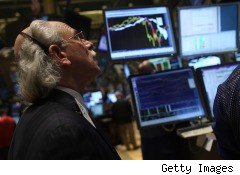 I’m not going to make you wait for this advice. It’s simple and direct: Pay no attention to Wall Street. I’m not asking you to believe me. Just listen to people who know better and have studied the securities industry.
I’m not going to make you wait for this advice. It’s simple and direct: Pay no attention to Wall Street. I’m not asking you to believe me. Just listen to people who know better and have studied the securities industry.
Steve Eisman is a perfect example. He was the hedge fund manager who made a fortune shorting the subprime market and every other company involved in that debacle. Here’s what he had to say about Wall Street, as quoted in Michael Lewis’ excellent book, :
“Not once in all these years have I come across a person inside a big Wall Street firm who was having a crisis of conscience. Nobody ever said ‘This is wrong’. . . . What I learned from that experience was that Wall Street didn’t give a s… what it sold.”
Eisman saved his choicest words when he explained why he shorted Merrill Lynch stock:
“We have a simple thesis. . . . There is going to be a calamity and whenever there is a calamity, Merrill is there. When it came time to bankrupt Orange County with bad advice, Merrill was there. When the Internet went bust, Merrill was there. Way back in the 1980’s, when the first bond trader was let off his leash and lost hundreds of millions of dollars, Merrill was there to take the hit.”
Why the Push for Actively Managed Funds?
Eisman couldn’t have been more correct. Merrill was definitely “there” when the subprime market crashed. The firm nearly collapsed after losing $50 billion in subprime loans. Its colleagues in the brokerage business didn’t do much better. Lehman went bankrupt. Bear Stearns was sold for a fraction of its precrash value. Morgan Stanley (MS) lost billions. The list goes on.
The daily grist of brokers is recommending actively managed funds (funds where the manager attempts to beat a given benchmark) to their clients. Usually, they base their recommendations on Morningstar ratings, past performance or their assessment of the fund manager’s investment skill. That there’s no support for any of these factors is irrelevant to them.
A recent study obliterated the notion that a five-star rating by Morningstar should influence investors. Among other findings, the study said only four of 248 funds with a five-star rating maintained that rating 10 years later.
Past Performance Is Even More Problematic
.
Another study looked at top-performing funds over a five-year period. Guess how many were able to repeat that performance in the following five years? Less than 10%.
What about the much-touted “investment expertise” of top-performing fund managers? It simply doesn’t exist.
A recent study determined that luck — not skill — explained outperformance by fund superstars. The well-credentialed authors conclude that investors should “. . . want low-fee, passive funds, unless you feel like paying these active managers the fees for basically not having performance that can be documented.”
Of course, all this misses an even more critical point: Why would you entrust your money to firms that can’t manage their own?
Passive Management Is All You Need
In turbulent times, you need sound, Nobel Prize-winning, academic-based advice to guide your investment decisions. Wall Street isn’t about to give you that.
Here’s what you should do: Determine how much risk you can take (you can find free asset-allocation tools on the Web, including a questionnaire on my website, smartestinvestmentbook.com). This will tell you how to divide your assets between stocks (riskier but with better growth potential) and bonds (stable but unlikely to keep up with inflation). Then purchase low-cost, passively managed stock and bond index funds divided according to your ability to withstand risk.
That’s it. No broker. No worry every day about the direction of the market or the musings of the “professionals.” Sleep well.


Leave a Reply